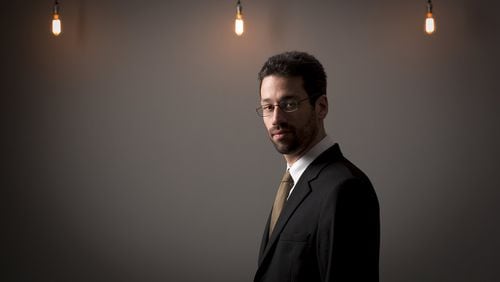It's understandable if Jonathan Biss becomes known as "the Beethoven guy."
The 37-year-old pianist has made a name for himself by performing and recording Beethoven’s 32 piano sonatas, solo pieces that span Beethoven’s entire compositional career. Biss is in the midst of a multi-year performance series of the full cycle at the Ravinia Festival in Chicago. He ends his three-year presentation of the sonatas at the Aspen Music Festival and School in August. In addition to his recital schedule, he is nearly finished with a nine-disc recording project of the compositions that commenced in 2011.
Now he's bringing his sonata show to Atlanta, part of the Atlanta Symphony Orchestra's two-year celebration of Beethoven and Leonard Bernstein.
Biss will perform the first of a series of special Wednesday night piano recitals Feb. 28 at Symphony Hall. The nearly 200 on-stage tickets reserved for Biss’ performances this season — he will return in April and May — sold out through subscription renewals, but floor seats were still available at press time. Biss will end his seven-recital run, encompassing the totality of Beethoven’s sonatas, with four concerts next season.
Biss will open the February concert with the first Beethoven sonata, Opus 2 in F minor, but from there he prizes musical variation over chronology. The pianist said performing the pieces over a year and a half doesn’t lend itself to a strict, orderly recitation. But the final recital next season will end with Beethoven’s last solo piano composition, and Biss isn’t dipping into the late-period sonatas early on in the recital series.
“The main thing for me about the Beethoven sonatas as a body of music is the variety in them,” Biss said. “The character from one piece to the next to the next is wildly different.”
The pianist came to the sonatas early on, attracted to Beethoven’s musical intensity. He was intrigued by the fact that Beethoven rarely repeated music across the entire sonata cycle. Above all else, he said, the structure of the sonatas keeps listeners engaged in the music.
“He keeps you in suspense as to how the music will unfold at any given time. He’s constantly setting up one expectation and subverting it the next moment,” he said. “The ‘Apassionata’ sonata was a piece that was my whole world when I was 12 and 13. Some of these sonatas really are the reason I am a musician.”
The 32 piano sonatas give audiences a real feel for who Beethoven was as a composer, said Evans Mirageas, the orchestra’s vice president of artistic planning.
“Our job and joy is to present orchestra music,” he said. “But to get the real litmus test for Beethoven, it’s his piano sonatas.”
In the past year, Georgia classical music listeners have been exposed to quite a bit of Beethoven. In addition to the ASO's ongoing Beethoven extravaganza, the Savannah Music Festival recently unfurled a Beethoven sonata spectacular of its own.
In 2017, Rob Gibson, the festival’s executive and artistic director, brought pianist Stewart Goodyear to Savannah to perform the entire cycle in a single day. Savannah audiences heard a nearly chronological interpretation of the solo piano pieces, in three large concerts.
“Of all the musical genres, the piano sonata is the only one that Beethoven worked on more or less consistently throughout his life,” said Gibson. “The sonatas reveal to us the story of Beethoven’s musical genius.”
The composer never intended to share this genius, in piano sonata form, with a wider audience. Owing to the performance standards of the day, Beethoven knew he would never hear them in public.
“There were no piano recitals in the age of Beethoven,” Biss said. “These were pieces that were not going to get performed. He was kind of free to make them as difficult and as adventurous and as unexpected as possible.”
While the musical language is similar, Biss points out that the sonatas differ greatly from Beethoven’s orchestral compositions like the piano concertos. The five symphonic piano pieces, which Jorge Federico Osorio recently performed with the ASO, were intended to be publicly played.
“He needed people to be impressed by them,” Biss said.
Biss’ ultimate goal is to perform the entire sonata cycle in one season, a plan he should achieve in 2020 after the release of his final two sonata recordings. For now, he’s happy to introduce audiences to the sonatas in smaller recitals spread across multiple seasons, finding new sources of inspiration in the music along the way.
“I’ll never be done with the sonatas. I’m sure after [the recording project] I might take a break because there are areas of the repertoire that I’ve had to ignore while I’m so immersed in Beethoven,” he said. “But these are pieces that are going to be lifelong companions.”
CONCERT PREVIEW
Jonathan Biss plays Beethoven sonatas. 8 p.m. Feb. 28, April 4, May 30. $50. Symphony Hall, 1280 Peachtree St. NE., Atlanta. 404-733-5000, www.atlantasymphony.org.


/cloudfront-us-east-1.images.arcpublishing.com/ajc/P7DYBH6TO7FEKG4SUXQQKADRXE.jpg)



